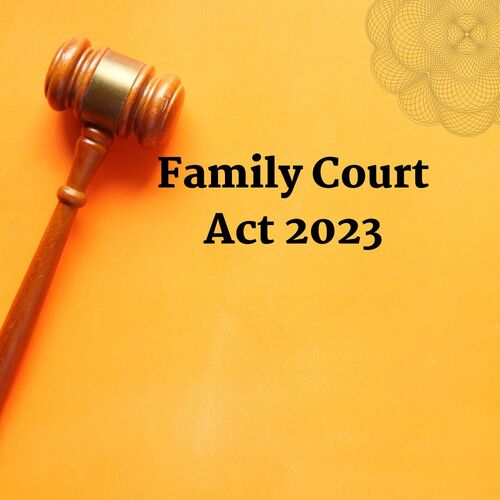The Parliament of Bangladesh has recently passed the Family Courts Act 2023 (hereinafter referred to as FCA 2023) by repealing the Family Courts Ordinance 1985 (hereinafter referred as to Ordinance 1985) which had previously been regulating the procedures related to the Family Courts of Bangladesh.
Although, quite unfortunately, the parliament couldn’t live up to the public expectation, rather failed to resolve pre-existing shortcomings, challenges and utter clumsiness of the Ordinance 1985 as apart from a few new provisions the FCA 2023 is pretty similar to the said flawed Ordinance.
There are two significant changes have been brought by FCA 2023 related to Bangladesh Family Courts’ procedures, such as increasing the court fee of family court cases and enhancing the definition of family appellate court.
Section 25 of FCA 2023 has increased the family court cases court fee to BDT 200 from BDT 25 and after the FCA 2023 comes into force appeals against the decree of Family Trial Courts can be brought to the Courts of District Judges including to any courts of other judges equivalent to district judges, e.g., Woman and Children or Labor Courts, which will help to reduce the burden of cases. Other than that, the FCA 2023 has permitted to adduce witness evidence in the court through affidavit without being present at the trial, which has been newly added to the family courts procedures by Section 13(6) of the FCA 2023.
Moreover, previously according to Section 17 (2) (b) of the Ordinance 1985, no appeal shall lie from a decree passed by a Family Trial Court for a dower not exceeding BDT 5000. The FCA 2023 has repealed the said provision of the Ordinance 1985 and increased the dower amount to not exceeding BDT 50000 in relation to appeal.
However, unfortunately, even after passing the FCA 2023 challenges and shortcomings of the previous Ordinance 1985 still remain in relation to Family Courts’ jurisdiction, who can seek redress from the family court re.
Restitution of marital rights, issues related to parents’ maintenance and post-divorce maintenance, and absence of Alternative Dispute Regulation (hereinafter referred to as ADR) option in the appellate stage.
According to Section 5 of FCA 2023, the Family courts have the jurisdiction to try and dispose of any suit related to matters, such as dissolution of marriage, restitution of conjugal rights, dower, maintenance and guardianship and custody of children, which remains the same as the Section 5 of the previous Ordinance 1985.
But, there are various important aspects of family life and family law which remained out of the jurisdiction of the family courts even after the commencement of the FCA 2023, such as marriage, adoption, will, hiba, succession, maintenance of parents, and so on.
However, according to the High Court Division of Bangladesh Supreme Court, the family courts can deal with any matter “relating to or arising out of” dissolution of marriage, restitution of conjugal rights, dower, maintenance and guardianship and custody of children; Md Chand Miah vs Rupnahar cited in 51 DLR 1999 (HCD) 292.
Therefore, the Family Courts have a wide jurisdiction over the family matter and the interpretation of Section 5 of FCA 2023 should not be done in a rigid manner. For example, the validity of the marriage can be dealt with by the Family Courts as decided by the High Court in the above-mentioned case.
Besides, genuineness of the kabinnama was scrutinized by the family court in Shafiqul Huq v Mina Begum 54 DLR (2002) 481 and in Abdul Hashem vs Mahmuda Khatun 64 DLR (2012) 494 Justice Emdadul Haque stated that S 5 of the Ordinance 1985 impliedly empowers the family courts to try and dispose of matter related to child legitimacy if it arises out of the matter of guardianship and custody of children.
Moreover, the confusion related to who can come to the family court for restitution of marital rights still remains unsettled even after the commencement of the FCA 2023 similar to the repealed Ordinance of 1985.
Previously, there was a well-settled judicial rule that only a husband can come to the family court for restitution of conjugal rights.
But, in Nelly Zaman vs Giasuddin Khan, the court ruled that the husband suing for the forcible restitution of conjugal rights against an unwilling wife is outmoded, untenable, and incompatible if considered in relation with the constitutional principles of equality before law and under Art. 27 and equal protection of law under Art. 31 for both men and women.
Despite such a commendable decision from the judiciary, the parliament couldn’t clarify the said dilemma through FCA 2023 which is disappointing.
Another potential failure of parliament in passing the new FCA 2023 is related to keeping no window open for ADR in the appellate stage. The parliament has passed the new FCA 2023 with the new provision i.e., Section 18 and 19 related to appeal cases against family trial courts’ decision to reduce the pressure on the district judges,, which is commendable.
But, reducing the increased backlog of cases in the judiciary should’ve been addressed by the parliament by inserting explicit provisions related to ADR even in the appellate stage through FCA 2023.
Whereas the parliament has inserted Section 89C to the Code of Civil Procedure 1906 through amending act i.e., The Code of Civil Procedure (Amendment) Act 2006 to incorporate ADR at the appellate stage of civil cases to reduce the backlog of cases, but the parliament has not shown any interest to add ADR mechanism to resolve family disputes.
Although Section 10 of the previous Ordinance of 1985 and Section 11 of the newly enacted FCA 2023 both contain similar provisions related to pre-trial proceedings keeping an interpretational window open to use ADR in family disputes before going to the Family Trail Court there is no provision related to ADR in the appellate stage that could’ve been added through FCA 2023.
Author-
MD EISTIAK BIN FARUQUE
Legal Associate
Advocacy Legal

